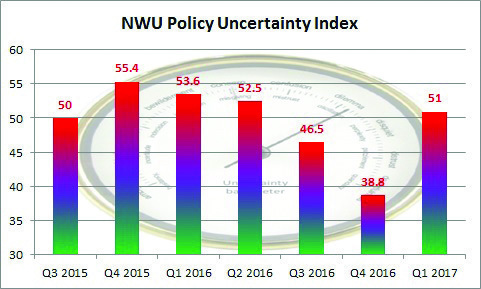The South African Chamber of Commerce and Industry (SACCI) Business Confidence Index fell to 93.2 in May, the lowest so far this year, from this year’s high of 97.7 reached in January.
SACCI blamed the drop on political uncertainty after the 31 March cabinet reshuffle. “Heightened political tensions, additional economic policy uncertainty and lower credit ratings by rating agencies that converged towards the end of March 2017, continued to effect the business climate negatively in May 2017,” the lobbying group said.
It said the largest negative monthly effect on business confidence in May came from notably lower merchandise import volumes, lower real value of building plans passed and higher real financing costs. Compared with the May 2016 multi-year low level of 91.8, SACCI noted that the stronger rand exchange rate and lower consumer inflation made the most notable positive year-on-year contributions. SACCI highlighted the ratings agencies’ concerns about weak economic growth, political uncertainty and the lack of state-owned enterprise reform.
North West University School of Business and Governance economist Professor Raymond Parsons said that the political uncertainty was a tax on South Africa’s economic performance. “Two successive quarters of negative economic growth mean that SA experienced a ‘technical recession’ in the six months’ period October 2016 to March 2017 and is officially in recession. While this development may have come as a shock to many observers, it was presaged in the Policy Uncertainty Index (PUI) for 1Q 2017 released in April,” Parsons said.
“Whether we like it or not, the South African economy is entering rough seas, and the storm signals are up. On the positive side the agriculture and mining sectors in particular are still likely to support South Africa’s economic momentum this year. Fortunately, the global economic outlook is presently also more favourable. But business and consumer confidence are still both at low levels and economic activity in South Africa is likely to be slow and uneven in the months ahead.
“Policy uncertainty has become a tax on South Africa’s economic performance. To change the situation requires at least that policies should become clear, consistent, coherent and growth-oriented, and indisputably linked to the National Development Plan and its implementation,” he added.


